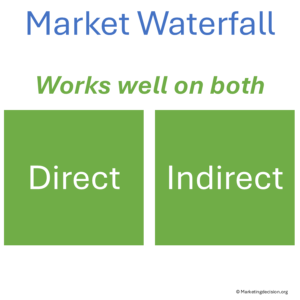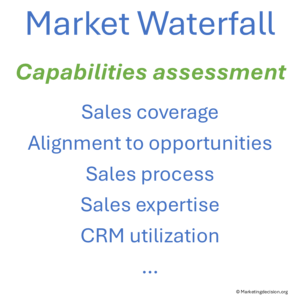 Engaging in discussions with Sales and Marketing teams is key to thoroughly assess the company’s go-to-market performance. Specifically, crucial topics such as market visibility, market share, and market intelligence can best be addressed with the Market Waterfall Analysis.
Engaging in discussions with Sales and Marketing teams is key to thoroughly assess the company’s go-to-market performance. Specifically, crucial topics such as market visibility, market share, and market intelligence can best be addressed with the Market Waterfall Analysis.
The Market Waterfall provides a detailed and structured view of volumes, from the total market down to final orders or sales. It offers a shared platform for in-depth discussions on current performance and areas needing improvement. Through this analysis, teams can identify corrective actions to enhance market penetration and overall visibility.

There are several key business questions that can be addressed with the Market Waterfall Analysis:
There is usually no 100% visibility. In many markets, private or public customers may renew contracts without tendering or consultation. You can estimate your share of market renewed without competition to evaluate the same for your competitors.

The Market Waterfall Analysis offers a comprehensive view of the market journey, from the total market perspective down to what is successfully captured at each step. This tool is particularly useful when working through distributors, as it allows for independent data collection and performance analysis. It provides valuable insights to discuss market presence, visibility, and competitive positioning.
This tool is particularly useful when working through distributors, as it allows for independent data collection and performance analysis. It provides valuable insights to discuss market presence, visibility, and competitive positioning.
For organizations with a direct salesforce, the Market Waterfall is an opportunity to evaluate performance against expectations, assess CRM utilization for visibility, and analyze sales coverage, expertise, and alignment with market opportunities.
In these discussions, it is essential to involve both Sales and Marketing teams to ensure collaboration and alignment.
Implementing a Market Waterfall can be challenging, whether due to limited reliable data or the difficulty in aligning Sales and Marketing teams on data sources and definitions.

In spite of these challenges, it remains a powerful transparency tool for improving market presence and visibility.
Key benefits include:
By identifying improvement areas, the Market Waterfall Analysis helps prioritize actions such as better CRM usage, new product introductions, or exploring additional distribution channels.
The Market Waterfall is more than just a tool — it is an investment in understanding your market, improving visibility, and driving coordinated strategic actions.
Even if data gaps exist, it is essential to capture confirmed data points (for example, from CRM systems) and estimate the remaining variables. Seek input from Sales and Marketing teams based on their field insights and market knowledge.

To ensure productive discussions, appoint a moderator who can guide the conversation toward clear performance improvements while keeping shared objectives in focus.
Use the Market Waterfall Analysis as a collaborative platform to develop actionable strategies, such as improving CRM usage, introducing new products, or expanding into new channels.
Actionable steps may include:
By prioritizing and assigning ownership to these actions, the Market Waterfall becomes an invaluable framework for assessing and enhancing market presence.
 When implementing the Market Waterfall, it is important to clarify the scope of measurement — whether it covers orders (what customers sign) or sales (what is ultimately delivered). Definitions vary by industry, but this distinction is crucial.
When implementing the Market Waterfall, it is important to clarify the scope of measurement — whether it covers orders (what customers sign) or sales (what is ultimately delivered). Definitions vary by industry, but this distinction is crucial.
Measuring from orders to sales helps identify price or margin erosion factors that impact both revenue and profitability.
For an initial assessment, focus on the waterfall up to orders to understand market share and short-term improvement opportunities.
Later, include the steps between orders and sales to capture issues that affect the top line and margin, such as quality or delivery delays.
Ultimately, the Market Waterfall is a powerful tool for visualizing contributions from the total market down to actual sales, helping teams align insights and actions across functions.
Discussions around the Market Waterfall Analysis can be complex if definitions are unclear or external data is not leveraged.
For example, the notion of addressable market may differ between sales teams and development teams — for some, it refers to sales coverage capability, while for others, it describes the total market that could be served if the company held a 100% share.
A useful reference is the Wikipedia article on Total Addressable Market and the Corporate Finance Institute guide on TAM.
It is recommended not to use the “addressable market” as a definition for sales coverage, but rather as the total market your solutions address. This includes all customers that could potentially purchase your solutions, even if competitors offer similar products or technologies.
This broader view defines the market your sales team competes in, excluding segments where your solutions are not relevant or competitive.
The Market Waterfall Analysis is an essential marketing and sales alignment tool.
It helps organizations understand market visibility, evaluate coverage, and identify opportunities for growth and efficiency.
By combining data transparency, cross-functional collaboration, and actionable insights, it supports smarter go-to-market decisions and stronger competitive positioning.
Explore related tools such as the Decision Prioritization Matrix or the Marketing Plan Creation framework to continue improving strategic alignment and market performance.
Waterfall indicators become even more meaningful when anchored in a clear understanding of customer behaviors. For this broader view, see our Customer Mix framework.
Market waterfall findings often reveal solution gaps. For a structured perspective on solution definition, visit the Solution Mix chapter.
Waterfall metrics (total market → addressed → visible → quoted → won) gain clarity when linked to market structure and coverage assumptions. See Market Mix for the foundations behind waterfall interpretation.
Market Waterfall Analysis is a marketing and sales alignment tool that provides a detailed view of the market journey — from the total market down to final orders or sales. It helps assess market visibility, sales coverage, and performance, enabling teams to identify opportunities and improve go-to-market efficiency.
Market Waterfall Analysis improves visibility by mapping the flow of opportunities from the total market to captured sales. It highlights data gaps, sales coverage issues, and missed opportunities, helping Marketing and Sales teams identify corrective actions and strengthen overall market presence.
To implement the Market Waterfall Analysis, companies should gather confirmed data from CRM systems and estimate missing information based on team insights. Discussions should involve both Sales and Marketing teams, guided by a moderator, to ensure collaboration and identify actionable strategies such as improving CRM utilization, introducing new products, or expanding into new channels.
© marketingdecision.org
The use of visualization tools—such as waterfall charts—is highly beneficial when assessing data quality from CRM or other internal systems.
Since CRM data may lack visibility into competitor transactions, complementary estimation techniques can improve accuracy.
Using waterfall charts to visualize data flows, corrections, and stepwise progressions provides a clearer and more complete picture of total market activity.
The following section may include tools, some free, some with a fee to support this site development. If you consider a tool should be presented in this section and is missing, please let us know at: contact@marketingdecision.org
The Market Waterfall provides a comprehensive view of the market journey, from the total market perspective down to what is successfully captured at each step.  This tool is particularly beneficial when working through distributors, as it allows for independent data collection and analysis. It offers key insights to facilitate discussions on market presence, visibility and competitive positioning.
This tool is particularly beneficial when working through distributors, as it allows for independent data collection and analysis. It offers key insights to facilitate discussions on market presence, visibility and competitive positioning.
For organizations with a direct salesforce, the Market Waterfall provides an opportunity to evaluate performance against expectations, assess CRM utilization for visibility, analyze sales coverage, expertise, and alignment with market opportunities. In these discussions, it is crucial to involve both Sales and Marketing teams to foster collaboration and alignment.
Use this waterfall tool to evaluate the waterfall chain for one single segment or multiple ones.
© 2026 MARKETING DECISION SOLUTIONS. All Rights Reserved.
We use cookies to improve your experience on our site. By using our site, you consent to cookies.
Manage your cookie preferences below:
Essential cookies enable basic functions and are necessary for the proper function of the website.
These cookies are needed for adding comments on this website.
Stripe is a payment processing platform that enables businesses to accept online payments securely and efficiently.
Service URL: stripe.com (opens in a new window)
Statistics cookies collect information anonymously. This information helps us understand how visitors use our website.
Google Analytics is a powerful tool that tracks and analyzes website traffic for informed marketing decisions.
Service URL: policies.google.com (opens in a new window)